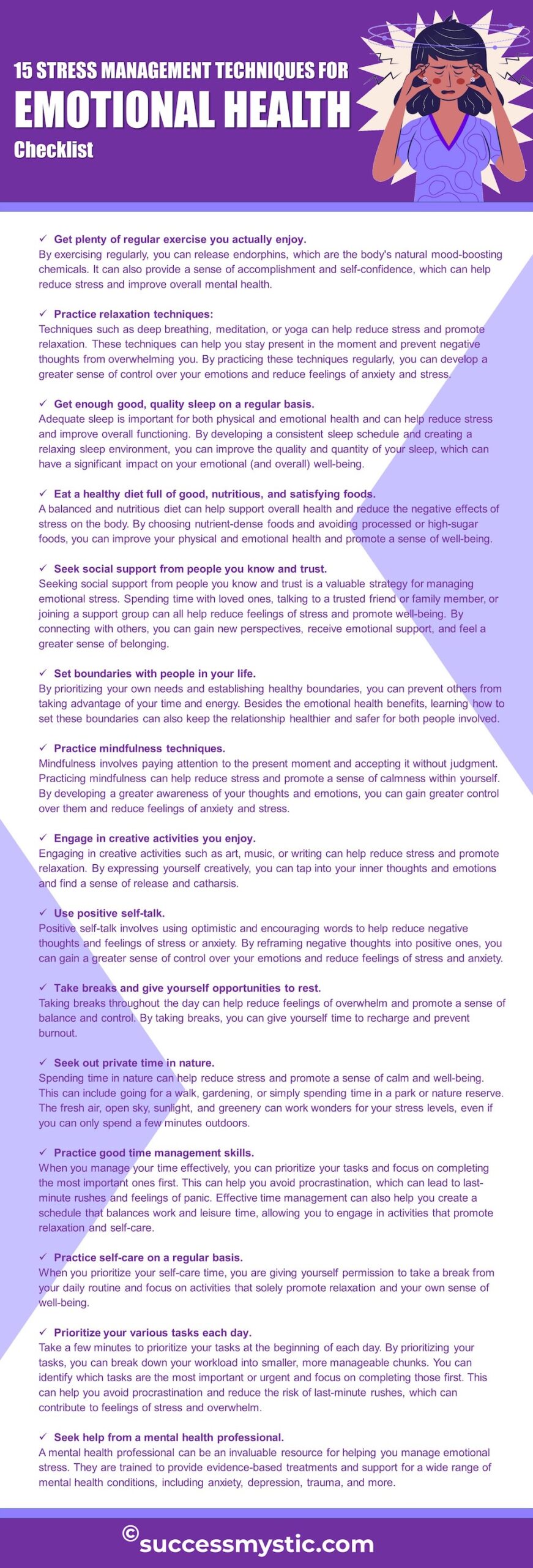What Is Emotional Stress
The American Psychological Association (APA) defines emotional stress as “an unpleasant emotional state characterized by a pattern of psychological, physiological, and behavioral responses to a real or imagined stimulus that is perceived as threatening or challenging.”
While there are many types of stress, emotional stress is a specific type that is characterized by the perception of a threat or challenge to one’s emotional well-being. Unlike physical stress, which is caused by a direct physical threat or demand, emotional stress arises from a psychological or emotional stimulus.
Emotional stress is the mental and physiological response to a perceived threat, challenge, or demand that taxes an individual’s coping resources. Emotional stress can manifest in a variety of ways, including feelings of anxiety, sadness, anger, frustration, or fear, and can affect an individual’s ability to function effectively in daily life.
Because emotional stress can emerge for a variety of reasons and in a variety of ways, understanding how it functions and how it can affect you is essential. All people will experience stress at different points in their lives; emotional stress is a common type that all people will encounter at some time. Understanding what it is and how it functions is an essential part of learning how to handle it properly and healthily.
Recommended Stress Hack: Release stress, tension, and anxiety in just minutes a day. Listen to this self-hypnosis track to rewire the mind to overcome stress and build mental resilience. It’s time to feel energetic, refreshed and ready to take on a new day! Click here to STOP STRESS.
7 Common Signs Of Emotional Stress
Emotional stress can manifest in a variety of ways, and the signs and symptoms can vary from person to person.
However, some common signs of emotional stress can include…
1| A heightened sense of anxiety and worry.
Feeling anxious or worried, even in the absence of an actual threat or danger, can be a sign of emotional stress. If you notice your own senses of anxiety and worry escalating, it can be a sign that emotional stress is affecting you negatively.
2| Extreme mood swings and shifts.
Emotional stress can lead to mood swings, including feelings of sadness, anger, irritability, or frustration. If you notice yourself flip-flopping moods suddenly and without reasonable cause, you may be struggling with emotional stress.
3| Feeling physical symptoms.
Chronic emotional stress can lead to physical symptoms such as headaches, muscle tension, fatigue, or changes in appetite or sleep patterns. Take note of when you develop symptoms like these – they may be signs of emotional stress affecting your body.
4| Difficulty concentrating and focusing.
Emotional stress can interfere with an individual’s ability to concentrate or focus, making it harder to complete tasks or make decisions. When you’re emotionally stressed, the thought of focusing on anything else except your stressors can seem impossible.
5| Exhibiting avoidance behaviors.
Individuals who are experiencing emotional stress may avoid situations or activities that they perceive as stressful or threatening. Note whether or not you try to avoid anything in your life – it may be a source of emotional stress for you.
6| Withdrawing from social situations and environments.
Emotional stress can also lead to social withdrawal, as individuals may isolate themselves from friends and family. Rather than wanting to spend time with the people you love most, you may shy away from them, preferring to isolate.
7| Using substances as a self-soothing mechanism or means of escape.
Some individuals may turn to alcohol, drugs, or other substances as a way of coping with emotional stress. While these may seem like good, quick short-term solutions, they can have long-term negative consequences.
You might like: Stress Management For Men – The Complete Guide
10 Negative Consequences Of Mismanaged Emotional Stress
1| Physical health problems.
Chronic emotional stress can lead to physical health problems, such as cardiovascular disease, high blood pressure, digestive issues, and weakened immune function.
According to the American Psychological Association, this is because the body’s stress response system releases hormones like cortisol and adrenaline, which can have a negative impact on the body over time. In short bursts, sudden releases of cortisol and adrenaline are helpful because they motivate a person to engage in a “flight, fight, or freeze” response.
However, if a person experiences bursts of these hormones repeatedly for a long period of time, they may suffer from some serious physical conditions. For example, chronic stress can cause the heart to work harder, leading to an increased risk of heart disease. It can also weaken the immune system, making it more difficult to fight off infections.
2| Mental health problems.
Emotional stress can also contribute to mental health problems such as anxiety and depression. This is because chronic stress can cause changes in the brain’s chemistry and structure, leading to imbalances in neurotransmitters like serotonin and dopamine, which can affect mood and behavior. Over time, these changes in mental health can become more established and more difficult to manage.
3| Impaired cognitive function.
Unmanaged emotional stress can impair cognitive function, making it harder to concentrate, remember things, focus on tasks, and make good decisions.
This is because the stress response can cause the prefrontal cortex (the part of the brain responsible for executive functions like decision-making and attention) to become less active, according to Bruce S. McEwen in his 2017 article Neurobiological and Systemic Effects of Chronic Stress, written for Sage Journals.
4| Impaired work and/or academic performance.
Emotional stress can interfere with an individual’s ability to perform well at work or school. This is because stress can cause distractions and reduce productivity, making it harder to focus and complete tasks efficiently. Over time, this can create even more stress within a person’s life as their academic or professional work performance begins to suffer.
5| Relationship problems.
Unmanaged emotional stress can put a strain on relationships, as individuals may become irritable, withdrawn, or avoidant. This can lead to communication breakdowns and interpersonal conflict, damaging the quality of personal and professional relationships alike.
6| A lack of interest in hobbies and pastimes that were once enjoyable.
Unmanaged emotional stress can cause you to lose interest in your favorite hobbies and pastimes. Instead of enjoying the activities that normally help you “escape” daily living and find enjoyment, you may feel completely uninterested in them. Emotional stress can divert your attention away from these typically beloved hobbies.
7| Difficulty processing and understanding emotions.
When you’re under serious emotional stress, you might find yourself struggling to really understand your emotions. You may not even want to try processing them – the idea of exploring and then working through big emotions may feel impossible to do. Unfortunately, the longer you avoid processing emotions, the bigger and more challenging they can become.
8| Feeling detached from other people.
Emotional stress can make social interaction feel like a chore. When you have the chance to be alone, you may choose that option rather than spending time with friends or family. Over time, this purposeful avoidance can lead to feelings of loneliness and even isolation.
9| An increased risk of making mistakes or getting into accidents.
When a person’s emotions are running high, they are far more likely to make mistakes or get into accidents. Intense emotions – and the stress that can cause them to mount – can cause people to think and act irrationally. Rather than being careful about what they’re doing, they might make a rash decision that can lead to serious consequences.
10| Decreased quality of life.
Unmanaged emotional stress can diminish an individual’s quality of life, hindering their ability to enjoy activities, maintain relationships, and achieve goals. It can make it hard to engage in activities that once brought joy, strain relationships, and hinder progress towards objectives.
Over time, the decrease in pleasure among all these routine activities can lead to a poor quality of life. To maintain overall well-being, it’s essential to develop effective coping strategies and seek support when needed.
Hone Your Problem Solving Skills To Reduce Stress
10 Benefits Of Managing Stress That Affects Emotional Health
Learning how to manage emotional stress can be tough, but the payout is absolutely worthwhile, both in the short and long term. Consider these ten major benefits of learning how to manage stress that affects your emotional health, as outlined by the United States Department of Health and Human Services:
1| You will experience improved physical health.
Managing emotional stress can help reduce the risk of stress-related physical health problems such as heart disease, high blood pressure, and digestive issues. By managing emotional stress, individuals can help reduce their risk of these stress-related health problems.
Effective stress management techniques, such as exercise, mindfulness meditation, and cognitive-behavioral therapy, can help reduce the body’s stress response, lowering the levels of stress hormones and promoting relaxation.
This can lead to lower blood pressure, improved heart health, and better digestion. In addition, by reducing emotional stress, individuals may be more likely to engage in other health-promoting behaviors such as regular exercise, healthy eating, and getting enough sleep, which can further contribute to improved physical health.
2| You will experience improved mental health.
By managing emotional stress, individuals can help reduce their risk of developing mental health problems. Effective stress management techniques, such as regular exercise, mindfulness meditation, and talking to a mental health professional can help individuals cope with stress and build resilience.
For example, regular exercise can boost mood and reduce symptoms of anxiety and depression. Mindfulness meditation can help individuals become more aware of their thoughts and feelings and develop a more positive and accepting attitude towards them, which can help reduce stress and improve mental well-being.
In addition to reducing the risk of mental health problems, effective stress management can also help individuals who are already struggling with anxiety or depression. By learning effective coping strategies, individuals can better manage their symptoms and improve their overall quality of life.
3| Your sleeping habits will improve.
Managing emotional stress can help improve sleep quality, making it easier to fall asleep and stay asleep. Experiencing unmanaged stress can wreak havoc on sleeping patterns and habits. Stress can cause you to sleep too much, sleep too little, and struggle to stay asleep all night. Once you can manage your stress levels, you’ll notice yourself returning to better, healthier sleeping patterns.
4| You will experience increased energy levels.
Chronic emotional stress can take a toll on both physical and mental energy levels. When individuals are dealing with stress, they may feel exhausted and fatigued, both mentally and physically. This can make it difficult to focus, complete tasks, and engage in activities that they enjoy.
By managing your emotional stress, you can help increase your energy levels and reduce feelings of fatigue. Effective stress management techniques, such as exercise, good nutrition, and adequate sleep can all contribute to increased energy levels.
Regular exercise, for example, has been shown to boost energy levels and reduce feelings of fatigue. Eating a healthy diet that includes plenty of fruits, vegetables, and whole grains can also help provide the body with the nutrients it needs to function optimally, reducing feelings of fatigue and promoting overall wellbeing. Additionally, getting adequate sleep is essential for replenishing energy levels and restoring the body and mind.
5| You can improve your personal relationships with others.
Effective stress management can help improve communication and reduce conflict in relationships, leading to stronger and more fulfilling connections with others. Chronic emotional stress can take a toll on personal relationships, causing communication breakdowns and increasing the risk of conflict.
By managing your emotional stress, you can use effective communication skills and coping strategies more easily. These skills and strategies can help reduce tension and promote better relationships. For example, mindfulness meditation can help individuals become more aware of their thoughts and feelings, making it easier to communicate clearly and calmly. Cognitive-behavioral therapy can also help individuals identify and challenge negative thinking patterns that can contribute to conflict and emotional stress.
6| You might notice increased productivity levels.
Managing emotional stress can improve cognitive function and concentration, making it easier to focus and be productive in your daily life. Chronic emotional stress can impair cognitive function, making it difficult to concentrate, remember things, and make sound decisions.
By managing your emotional stress, you can reduce the impact of stress on the brain and improve your overall cognitive function. Regular exercise, for example, has been shown to improve cognitive function and concentration, as has mindfulness meditation. By taking action to reduce emotional stress, individuals can also reduce the distractions and negative thinking patterns that can interfere with productivity.
7| Your decision-making skills can improve.
Effective stress management can improve decision-making skills by reducing cognitive distortions and emotional reactivity. Chronic emotional stress can impair decision-making skills, leading to impulsivity, indecision, and poor judgment.
By managing your emotional stress, you can improve your ability to make decisions by developing more effective coping strategies. For example, mindfulness meditation can help individuals become more aware of their thoughts and feelings, reducing emotional reactivity and promoting more thoughtful decision-making.
8| You will notice a higher sense of self-esteem.
Reducing emotional stress can improve self-esteem and confidence, which can help you feel more capable and resilient. Chronic emotional stress can take a toll on self-esteem, contributing to feelings of worthlessness, inadequacy, and low self-confidence. By managing emotional stress, you can learn effective coping strategies and build resilience, improving your overall sense of self-esteem and confidence.
9| Your overall happiness levels will increase.
Effective stress management can lead to increased feelings of happiness and well-being, as individuals feel more in control of their lives and able to enjoy activities and relationships.
Chronic emotional stress can contribute to feelings of sadness, hopelessness, and poor mood. By managing your emotional stress, you can reduce negative emotions and promote more positive feelings of happiness and well-being.
10| You can enjoy the likelihood of living a longer life.
Managing your emotional stress can help reduce the risk of stress-related health problems, potentially increasing your longevity and overall quality of life. Chronic emotional stress can contribute to a variety of health problems, including heart disease, high blood pressure, and diabetes, all of which can impact your likelihood of living a long, healthy life.
By managing emotional stress properly, you can reduce the physical impact of stress on the body and promote overall health and well-being. Regular exercise, healthy eating, and stress-reduction techniques like mindfulness meditation can all contribute to reducing stress and improving overall health, potentially increasing longevity and quality of life.
The Complete To-Don’t List For Stress Management
15 Ways To Identify Sources Of Emotional Stress Within Your Life
Pinpointing exactly what is causing excessive emotional stress in your life isn’t always easy to do. If you are struggling to determine exactly what is causing your emotional stress levels to soar, you can do some investigating to get to the roots of the issue.
Consider these fifteen methods you can try using to identify sources of emotional stress in your own life:
1| Keep a journal as a self-reflection tool.
Spend some time each day reflecting on your thoughts and feelings and note any sources of stress that come up in a journal. Forcing yourself to focus and think back through your day can help you create a record of potential patterns between your different days; within these patterns, you may be able to identify specific patterns that point to emotional stressors.
2| Identify your unique stress triggers.
Pay attention to situations or people that consistently cause you to feel stressed or overwhelmed. All people have their own unique sets of triggers, or stimuli that evoke uncomfortable, unpleasant responses within them. Take note whenever you notice stress beginning to creep into your life – you may be able to identify your specific emotional stress triggers and squash them before they become bigger issues.
3| Evaluate your personal relationships.
Assess the quality of your relationships with family, friends, coworkers, and other important people in your life. Sometimes, these relationships can be more toxic than positive; when this happens, the relationships may serve as a source of emotional stress within your life that is causing you more harm than good.
4| Assess your current work-life balance.
Evaluate how much time you are spending on work, leisure, and other activities, and assess whether your schedule is balanced. Sometimes, people discover that they spend far too much time at work, which creates an unhappy balance in their personal lives. Rather than spending time with friends and family or engaging in enjoyable hobbies, people discover that they’re spending too much time at work, leading to dissatisfaction and other emotional stress.
5| Identify physical stressors within your environment.
Some people are highly sensitive to even the smallest irritants within their physical space. Identify any physical stressors in your environment, such as noise, light, or temperature. Over time, these pesky little stressors can cause you to feel emotionally strained as you try to work with them, around them, or through them.
6| Assess your current financial situation.
Evaluate your financial situation and assess whether it is causing stress or anxiety. Your finances have the power to affect almost every other area of your life, so when your financial situation is disordered, you may feel a lot of emotional stress because of it. For example, struggling with your finances can affect your romantic life, particularly if you and your partner share financial responsibilities.
7| Consider health factors that might be causing stress.
Assess whether any health issues, such as chronic pain or illness, are causing stress in your life. Even temporary ailments and illnesses can invite excess stress into your life. Not feeling well can cause you stress to challenge your emotions; developing undue emotional stress while working through an illness or injury isn’t uncommon at all.
8| Evaluate the expectations you have for yourself and others.
Consider whether you are putting too much pressure on yourself or have unrealistic expectations for yourself or others. Everyone wants to live a perfect life, but in reality, perfection does not exist. Be realistic about the expectations you put on yourself and others – if they are too out of reach or even downright unattainable, they are likely inviting lots of excessive, unnecessary emotional stress into your life.
9| Assess all of your daily routines.
Evaluate your daily routines and assess whether they are contributing to stress or making it more difficult to manage stress. Sometimes people will continue with old routines because they are familiar – even if they are no longer serving them positively. Changes in routines are often necessary over time; don’t hang on to old routines simply because they are familiar. Doing so can create tons of unnecessary stress within your life.
10| Reflect on your past experiences.
Reflect on past experiences that may be contributing to stress, such as trauma or past relationship problems. Letting go of past mistakes, failures, trauma, problems, and more can be challenging. However, learning how to let these experiences go is a key component of moving forward in a way that does not allow them to control your emotions or bring excess stress into your life.
11| Consider how frequently you are using social media.
Assess whether too much social media use is causing stress or anxiety. Constantly scrolling through your friends’ “highlight reels” of good-times-only moments can be stress-inducing because it encourages you to compare your own situations to the ones they are curating online. Social media also makes it easier to consume news, media, and more on a constantly updating basis, which can be a major stressor.
12| Evaluate your self-care habits and routines.
Assess whether you are taking care of yourself physically, emotionally, and mentally, and whether you need to make changes to improve self-care. Self-care time should be a cemented part of your everyday routine. Taking good care of yourself is essential for preventing extra stress from forming within your life; make sure you are making time for this regular chance to relax and refresh.
13| Consider your personal values and goals.
Reflect on your values and goals and assess whether you are living in alignment with them. If you ever notice that you are living life and making choices in a way that does not align with your personal values and goals, you may notice some feelings of stress and unease. Sometimes, people begin living in a way that derails these values and goals entirely; doing so can create tons of stress and unhappiness.
14| Seek feedback from people you trust.
Ask trusted friends or family members for feedback on areas of your life that may be causing stress and consider their perspectives. Asking for an outsider’s opinion on your personal situations can help you see what is happening from a different angle. Seeking feedback from someone you trust can help open your eyes to different possibilities and tame stress from taking over your emotions.
15| Consider any major life changes you have recently experienced or will soon experience.
Reflect on recent or upcoming major life changes, such as a move, a new job, or a relationship change. Any time you go through a major life change (and even when you are anticipating one coming up soon), you might notice emotional stress forming around all aspects of the change, including leaving behind the familiar to embrace something new.
How To Prevent Premature Aging Triggered By Chronic Stress
15 Ways To Manage Stress So It Doesn’t Damage Your Emotional Health
There are many strategies for managing emotional stress. Here are some examples:
1| Get plenty of regular exercise you actually enjoy.
Exercise has been shown to be an effective way to reduce stress, improve mood, and boost overall well-being. Because of this, regular exercise is a great strategy for managing emotional stress. It is an effective way to reduce stress levels, improve your mood, and boost your overall sense of well-being.
By exercising regularly, you can release endorphins, which are the body’s natural mood-boosting chemicals. It can also provide a sense of accomplishment and self-confidence, which can help reduce stress and improve overall mental health.
2| Get enough good, quality sleep on a regular basis.
Getting enough good, quality sleep on a regular basis is essential for managing emotional stress. Adequate sleep is important for both physical and emotional health and can help reduce stress and improve overall functioning.
By developing a consistent sleep schedule and creating a relaxing sleep environment, you can improve the quality and quantity of your sleep, which can have a significant impact on your emotional (and overall) well-being.
3| Eat a healthy diet full of good, nutritious, and satisfying foods.
Eating a healthy diet full of good foods is another important strategy for managing emotional stress. A balanced and nutritious diet can help support overall health and reduce the negative effects of stress on the body. By choosing nutrient-dense foods and avoiding processed or high-sugar foods, you can improve your physical and emotional health and promote a sense of well-being.
4| Seek social support from people you know and trust.
Seeking social support from people you know, and trust is a valuable strategy for managing emotional stress. Spending time with loved ones, talking to a trusted friend or family member, or joining a support group can all help reduce feelings of stress and promote well-being. By connecting with others, you can gain new perspectives, receive emotional support, and feel a greater sense of belonging.
5| Set boundaries with the various people in your life.
Setting boundaries with the various people in your life is also an effective way to manage emotional stress. Setting clear boundaries in your personal and professional life can help reduce stress and promote a sense of control within the relationship.
By prioritizing your own needs and establishing healthy boundaries, you can prevent others from taking advantage of your time and energy. Besides the emotional health benefits, learning how to set these boundaries can also keep the relationship healthier and safer for both people involved.
6| Practice mindfulness techniques.
Practicing mindfulness techniques can also be helpful for managing emotional stress. Mindfulness involves paying attention to the present moment and accepting it without judgment.
Practicing mindfulness can help reduce stress and promote a sense of calmness within yourself. By developing a greater awareness of your thoughts and emotions, you can gain greater control over them and reduce feelings of anxiety and stress.
7| Engage in creative activities you enjoy.
Engaging in creative activities you enjoy is another effective strategy for managing emotional stress. Engaging in creative activities such as art, music, or writing can help reduce stress and promote relaxation.
By expressing yourself creatively, you can tap into your inner thoughts and emotions and find a sense of release and catharsis. Sometimes, emotions can be difficult to explore – doing so through your choice of artistic activity can make the process much easier.
8| Use positive self-talk.
Using positive self-talk is another helpful strategy for managing emotional stress. Positive self-talk involves using optimistic and encouraging words to help reduce negative thoughts and feelings of stress or anxiety. By reframing negative thoughts into positive ones, you can gain a greater sense of control over your emotions and reduce feelings of stress and anxiety.
9| Take breaks and give yourself opportunities to rest.
Taking breaks and giving yourself opportunities to rest is another important strategy for managing emotional stress. Many people feel the pressure to be constantly on the go, but this attitude can set you up for emotional stress failure. Taking breaks throughout the day can help reduce feelings of overwhelm and promote a sense of balance and control. By taking breaks, you can give yourself time to recharge and prevent burnout.
10| Seek out private time in nature.
Seeking out private time in nature is also an effective strategy for managing emotional stress. Spending time in nature can help reduce stress and promote a sense of calm and well-being.
This can include going for a walk, gardening, or simply spending time in a park or nature reserve. The fresh air, open sky, sunlight, and greenery can work wonders for your stress levels, even if you can only spend a few minutes outdoors.
11| Practice good time management skills.
Practicing good time management skills can help reduce emotional stress by giving you a sense of control over your schedule and reducing feelings of overwhelm. When you manage your time effectively, you can prioritize your tasks and focus on completing the most important ones first. This can help you avoid procrastination, which can lead to last-minute rushes and feelings of panic.
Effective time management can also help you create a schedule that balances work and leisure time, allowing you to engage in activities that promote relaxation and self-care. By taking regular breaks throughout the day, you can reduce feelings of overwhelm and promote a sense of balance and control.
12| Practice self-care on a regular basis.
Engaging in self-care practices can be an effective way to reduce emotional stress. When you prioritize your self-care time, you are giving yourself permission to take a break from your daily routine and focus on activities that solely promote relaxation and your own sense of well-being.
Self-care activities can vary widely and can include things like taking a warm bath, reading a book, spending time in nature, practicing yoga or meditation, engaging in a creative hobby, or spending time with loved ones. These activities can help you reduce feelings of stress and promote a sense of calm and balance.
13| Prioritize your various tasks each day.
Prioritizing tasks can help reduce emotional stress by giving you a sense of control over your workload. When you have a lot of tasks to complete, it can be easy to feel like you don’t know where to start or how to manage your time effectively. This can lead to feelings of anxiety, stress, and even panic – all of which aren’t good for your emotional health.
Take a few minutes to prioritize your tasks at the beginning of each day. By prioritizing your tasks, you can break down your workload into smaller, more manageable chunks. You can identify which tasks are the most important or urgent and focus on completing those first. This can help you avoid procrastination and reduce the risk of last-minute rushes, which can contribute to feelings of stress and overwhelm.
14| Seek help from a mental health professional.
If emotional stress becomes a major interference in your daily life, consider reaching out to a mental health professional such as a therapist or counselor. A mental health professional can be an invaluable resource for helping you manage emotional stress. They are trained to provide evidence-based treatments and support for a wide range of mental health conditions, including anxiety, depression, trauma, and more.
When you seek help from a mental health professional, they can work with you to identify the root causes of your emotional stress and develop a personalized treatment plan to address your specific needs. This may include therapy, medication, or a combination of both.
15| Practice relaxation techniques.
Techniques such as deep breathing, meditation, or yoga can help reduce stress and promote relaxation. These techniques can help you stay present in the moment and prevent negative thoughts from overwhelming you. By practicing these techniques regularly, you can develop a greater sense of control over your emotions and reduce feelings of anxiety and stress.
Learn The Miracle That Is Meditation To Manage your Chronic Stress
The Bottom Line
In conclusion, managing emotional stress is an essential part of life. Everyone experiences stress; it is a natural and normal response to a challenge or difficult situation. However, chronic, and overwhelming stress can negatively impact your physical, mental, and emotional well-being.
Allowing emotional stress to continue unchecked can lead to serious complications in your life, including physical ailments, damaged relationships, difficulty socializing, and more.
While it may seem easier to ignore emotional issues, doing so can make these kinds of stressful situations feel even worse. Instead, it is better to learn methods for better managing your emotional stress.
Fortunately, there are many strategies you can use to manage emotional stress. These include exercising regularly, practicing relaxation techniques like deep breathing and yoga, getting enough quality sleep, eating a healthy diet, seeking social support from trusted individuals, setting boundaries, practicing mindfulness techniques, engaging in creative activities you enjoy, using positive self-talk, taking breaks, spending time in nature, practicing good time management skills, prioritizing tasks, engaging in self-care, and seeking help from a mental health professional.
By using these strategies and seeking help when you need it, you can build resilience and manage emotional stress effectively, leading to a happier and healthier life.








